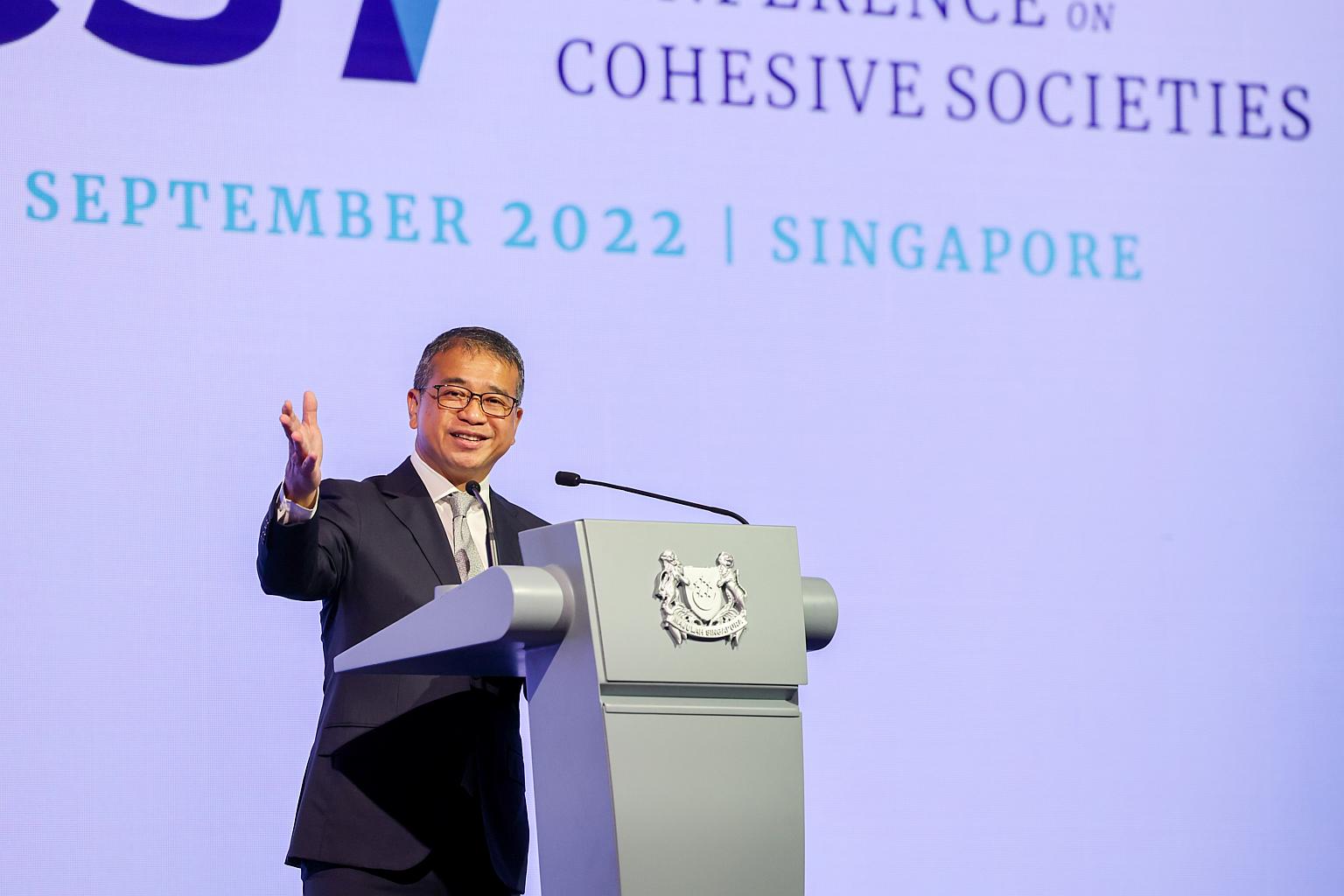Youth leadership crucial for social cohesion: Edwin Tong
Sign up now: Get ST's newsletters delivered to your inbox

Minister for Culture, Community and Youth Edwin Tong said there was a need to continue building a strong community of young social cohesion champions.
PHOTO: LIANHE ZAOBAO
SINGAPORE - Immersive virtual tours to explore local places of worship, an interfaith festival telling the story of ethnic and faith communities through music, and a card game that creates conversations around religion, ethnicity, nationality and disability are just some of the youth-led initiatives highlighted at the Young Leaders Programme (YLP).
The YLP is a platform for young local and international leaders to collaborate on initiatives to strengthen social cohesion. It is part of the International Conference on Cohesive Societies (ICCS), which is organised by the S. Rajaratnam School of International Studies (RSIS) and supported by the Ministry of Culture, Community and Youth (MCCY).
Speaking at the closing of the conference at Raffles City Convention Centre on Thursday, Minister for Culture, Community and Youth Edwin Tong said there was a need to continue building a strong community of young social cohesion champions.
Referring to the special address by Cardinal Pietro Parolin, Secretary of State of the Holy See, who spoke remotely from Vatican City on Tuesday, Mr Tong said he agreed wholeheartedly that "youth leadership is crucial in building a better society based on justice, fraternity and solidarity".
A total of 120 youth leaders joined the YLP this year, and MCCY will be providing funding to develop some of their projects. It will also build up the pool of YLP alumni and keep the virtual partners' showcase online as a resource for all.
Going beyond ICCS 2022, Mr Tong also called for the South-east Asian Social Cohesion Radar study by RSIS this year to be conducted regularly to track how social cohesion trends evolve in the region.
The study found that 69 per cent of those surveyed in South-east Asia believe that their country is socially cohesive.
Online questionnaires were filled out by 1,000 thought leaders from 10 Asean countries earlier this year. Though the study does not seek to rank the countries in quantifiable terms, it found that 81 per cent of thought leaders residing in Singapore said that social cohesion in the country was strong. This was followed by 73 per cent in both Thailand and the Philippines.
Said Mr Tong: "One common thread across our discussions about faith, identity and cohesion has been that mutual trust and shared experiences are critical in building cohesive societies."
He spoke about three reflections from the three-day conference.
First, that faith can bridge divides.
He highlighted how speakers such as India-based spiritual leader and social activist Sadhvi Bhagawati Saraswati, First Speaker of the Northern Ireland Assembly John Alderdice, and Imam Uzair Akbar of Holland Park Mosque in Australia mentioned how different beliefs could connect people through universal values that bind society together.
Mr Tong said that during crises and times of insecurity, different beliefs can widen divides. However, diversity can also increase resilience in the face of global challenges. For example, Singapore Taoist Mission's Master Tan Zhixia shared how local community body Humanity Matters brought people of different faiths together to provide local and regional pandemic and disaster relief.
Second, Mr Tong spoke of how diversity can be harnessed for the common good.
He cited ICCS as an example of diversity in action, where delegates from different countries and disciplines came together to develop insights and solutions.
Singapore may be one of the most religiously diverse societies in the world, but continuous efforts are made to strengthen religious harmony, he said.
Lastly, the minister reflected on how technology can be leveraged to foster mutual trust.
"With mutual trust, we can use technology as a truly powerful and positive enabler for social change," he said, adding that steps must be taken to mitigate technology's adverse effects and stamp out hate, violent extremism and misinformation.
In all, ICCS 2022 hosted more than 50 speakers and 800 delegates from about 40 countries and had over 300 online participants.


